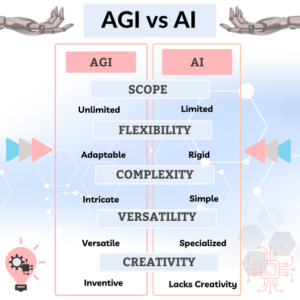Artificial general intelligence (AGI) is a controversial but promising theoretical development in artificial intelligence that aims to one day achieve human-level intelligence. Meta is the most recent tech company to target this area.
Meta is a social media behemoth. Last Monday, Meta CEO Mark Zuckerberg revealed the company’s long-term goal: to create AGI. There has been a rapid and intense backlash.
Even though this hypothetical AI technology does not exist as of yet, the shared objective of the majority of AGI developers is to create an AI system capable of intellectually matching or surpassing human performance.
Both the AI department at Google and OpenAI, founded by ChatGPT, have promoted AGI as a primary aim in their AI endeavors, despite the fact that it has raised numerous concerns among ethicists, lawmakers, and AI professionals.
Zuckerberg stated in a Facebook video that it has “become clearer” that “building full general intelligence” will be necessary for the next generation of technology services.

“Building the best AI assistants, AIs for creators, AIs for businesses, and more, that need advances in every area of AI, from reasoning to planning to coding to memory and other cognitive abilities,” noted Zuckerberg.
Issues by Meta’s open source strategy:
Meta is in the battle for artificial general intelligence (AGI), but its vision differs significantly from its competitors, according to Zuckerberg’s announcement.
Specifically, Zuckerberg mentioned that one of the company’s goals is to make the growing technology more accessible by making it open source or freely usable and modifiable by anybody.
He stated, “We should open source and make it as widely available as we responsibly can so that everyone can benefit.” He went on to say that the technology was crucial and had great potential.
Meta’s open-source strategy has prompted ire amongst industry professionals due to its tendency to place potent technology in the wrong hands, which is a specific concern of AGI’s that it might quickly disrupt technical norms.
Wendy Hall, a computer scientist from the United Kingdom and a member of the United Nations AI advisory committee, expressed her concern over open-source AGI in an interview with The Guardian, calling the idea “really very scary” and criticizing Meta for bringing it up.
Something like this might cause a lot of damage if it falls into the wrong hands. She criticized the corporation for being so reckless in suggesting it. She said, “I think it’s still many years away before such an aspiration can be achieved in any meaningful way, so we have time to put the regulation systems in place.”
Yann LeCun, chief AI scientist at Meta, praised the rapid advancement of AI at a discussion at last week’s World Economic Forum in Switzerland. He went on to say that open source was largely responsible for this growth.
“The reason why we’ve seen such fast progress in AI over the last decade or so is that people practice open research,” according to LeCun. “It makes the entire field accelerate because you have a lot of people working on it.”
Necessary steps toward domestic AI legislation have been taken by the Australian federal government, which has now released an interim response to industry input on responsible AI use.

In light of the exponential growth of AI, Australia will take a risk-based approach to regulating the industry. This means implementing measures to mitigate major threats, such as ongoing audits and third-party product testing, without stifling innovation or the economic benefits that come with AI.
Users on social networking site X pointed out the regulatory issues of open-sourcing artificial general intelligence (AGI) technology. Also, they criticized the technology for its energy consumption, which they viewed as ethically questionable.
“To release open source AGI before any legal regulation is suicidal,” user CramescoPC said. The user further added, “AGI in criminal hands can do a great deal of damage. Not to mention the mega energy consumption.”
According to Zuckerberg, Meta is constructing an “absolutely massive amount of infrastructure” to back its open-source AGI projects, and by the end of 2024, the business plans to have over 600,000 GPUs.
With the release of Llama 2, Meta’s own AI model, Zuckerberg went on to say that the business is training Llama 3, the next edition. Meta still hasn’t said when it wants to launch its AGI.




